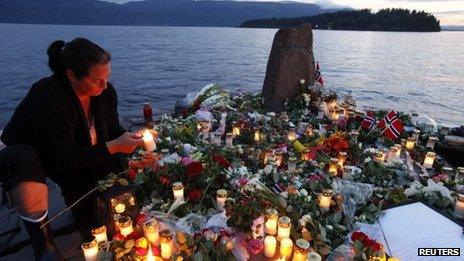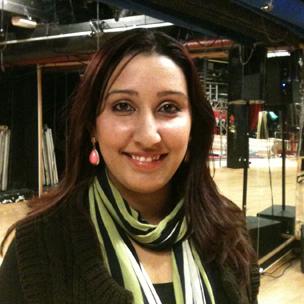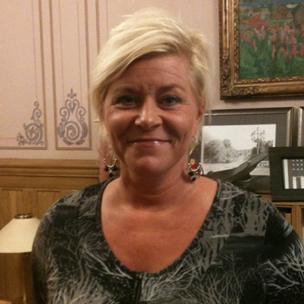Norway debates immigration in wake of Breivik killings
- Published

The July bombing and shooting attacks deeply shocked Norway
When Anders Behring Breivik attacked and killed 77 people in Norway last July, he published a manifesto in which he decried what he saw as the Islamisation of Europe and blamed immigration for many of the country's problems. Now, as Tom Esslemont reports, right-wing politicians are trying to reopen one of the country's most sensitive debates.
In Oslo, everyone knows the difference between "east" and "west".
The east is, generally, a more multicultural, ethnically mixed and poorer side of the capital than the glitzier, more commercial west.
When Norway opened its doors to immigrants some four decades ago, Oslo began to change dramatically. Today, 30% of the city's population is made up of first- or second-generation immigrants.
While many here are comfortable with immigration, it is clear that others have had difficulty adjusting to the idea of a multicultural Norway.
Before the 22 July attacks, a serious schism was opening up between that majority and those on the right who felt that immigration had taken place too rapidly, without proper integration.
'No boundaries'
"Prejudice dates back about 30 years," says Nafisa Jafni, whose parents immigrated from Pakistan before she was born.
"Back then it was only Pakistanis. Then it was Indians who came and Sri Lankans and now we have Somalis," she smiles.
She now volunteers at a youth club called X-ray. It is housed in a small converted warehouse close to the River Aker which divides east from west Oslo.
As I arrive to meet her, a young girl gracefully moves around the space to loud Indian music.
She twists her wrists to the rhythm and jangles her jewellery.

Norway-born Nafisa Jafni volunteers at Club X-Ray
She is one of the protagonists in a weekly dance workshop where women from different ethnic groups are encouraged to mingle and integrate.
White Norwegians meet Muslim girls who, here, can dance without headscarf or veil.
"When we are here we get to know people of those different cultures. The Kurdish girl, the Iraqi girl. It is here that I get to know them all. There are no boundaries."
Club X-ray is one of the few government-sponsored schemes to help foster links between different ethnic groups.
It was designed to counter opinion by some conservatives that some immigrants were, in their eyes, taking jobs away from "ethnic" Norwegians.
They also point to a rise in the city's crime rate in areas where the population is more ethnically mixed.
A small minority of far-right extremists began to discuss in online forums how much they wanted to see an end - or at least a limit to - rapid immigration.
One who took part in such discussions was Anders Behring Breivik, the man who went on to murder 77 people in a bombing of government buildings and a shooting massacre at a summer camp for members of the youth wing of Norway's governing Labour Party.
Other online activists have now disappeared into the shadows, fearful that they may be seen in the same vein as the mass murderer.
Similar ideology
Christen Krogvig leads a somewhat clandestine existence these days.
He is a far-right activist who spends much of his time in his one-bedroom flat on an internet forum called Stop the Islamisation of Norway.
He says its Facebook group has 1,000 members. When I ask him why he feels "Islamisation" as he calls it, is a problem, he says:
"When it comes to Islam, there is a long history of such [terrorist] attacks. And we think that the probability that Muslims will continue [to be the main perpetrators] is very high given that the Koran tells [Muslims] to do so."
Christen says he found the actions of Anders Breivik abhorrent, but he does not deny his ideology and that of the mass killer are similar.

Progress Party leader Siv Jensen - Norwegians need to tolerate that some people have views we don't like
Similarly, the most right-wing of all the main political parties, the Progress Party, has in the past campaigned on an anti-immigration ticket.
After the attacks, it saw its support fall to 11.4% in local elections last September from 17.5% in 2007. Now its leader, Siv Jensen, is fighting to bring back the debate about immigration into parliament.
"We need sometimes to tolerate that different people have different feelings that we don't like that we don't approve of," Ms Jensen says.
I ask her whether that means anti-Muslim comments on websites should be tolerated.
"We need to tolerate that people have different views," she answers.
"I think through debate that is the best way of fighting horrible meanings and thoughts," she says.
'We woke up'
In the multicultural east of Oslo, the immigration debate is already up and running in the classrooms of one secondary school.
Sandre Abel leads his pupils in a discussion about the benefits and down sides of a multiethnic society.
He looks around the room for someone whose parents were immigrants.
One Iraqi girl in the corner puts up her hand.
"My parents moved to Norway because they were persecuted in their home country," she says.
Her point is duly noted on the blackboard.
After class, Sandre tells me why he is passionate about confronting prejudice in the classroom.
"I think it was like we woke up after this happened on 22 July. We have to get this through dialogue."
"We don't want to stop talking about things, because nobody anticipated this. And the people affected were not just white Norwegians but all kinds of skin colours."
Back inside the pulsating Club X-ray, in the heart of Oslo, Nafisa watches the girls try out some of their moves.
The club was set up to encourage integration and you can see people enjoying its benefits - they share dance tips and make new friends.
But this is a small microcosm hidden away from the sensitive debate being rekindled in the media and in wider society about whether immigration generally is good or bad for this country - and threatens to deepen a rift already apparent in Norway.